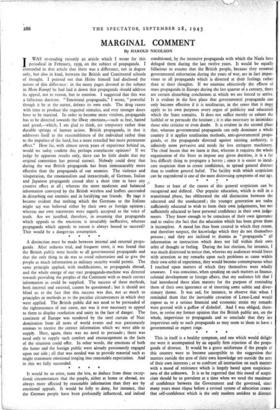MARGINAL COMMENT
By HAROLD NICOLSON
IWAS re-reading recently an article which I wrote for this periodical in February, 1939, on the subject of propaganda. I contended in that article that there was a difference, not in degree only, but also in kind, between the British and Continental schools of thought. I pointed out that Hitler himself had disclosed the nature of this difference: in the many pages devoted to the subject in Mein Kampf he had laid it down that propaganda should address its appeal, not to reason, but to emotion. I suggested that this was a fallacious doctrine. " Emotional propaganda," I wrote, " powerful though it be at the outset, defeats its own ends. The drug ceases with time to produce the required stimulus, and ever stronger doses have to be injected. In order to become more virulent, propaganda has to be directed towards the ldwer emotions,—such as fear, hatred and greed,—which, I am glad to think, are temporary rather than durable springs of human action. British propaganda, in that it addresses itself to the reasonableness of the individual rather than to the impulses of the herd, has a more retarded but more permanent effect." How far, with almost seven years of experience behind us, would we today confirm this perhaps complacent opinion? If we judge by apparent results only, there can be little doubt that my original contention has proved correct. Nobody could deny that during the war British propaganda has been immeasurably more effective than the propaganda of our enemies. The violence and vituperation, the emotionalism and inexactitude, of German, Italian and Japanese propaganda ceased after a short time to have any creative effect at all ; whereas the more moderate and balanced information conveyed by the British wireless and leaflets succeeded in disturbing our enemies and in fortifying our friends. By 1941 it became evident that nothing which the Germans or the Italians might say was believed either by their own or foreign opinion ; whereas our own statements were eagerly accepted as the voice of truth. Are we justified, therefore, in assuming that propaganda which appeals to the emotions is invariably ineffective, whereas propaganda which appeals to reason is always bound to succeed? That would be a dangerous assumption.
* * * *


























 Previous page
Previous page